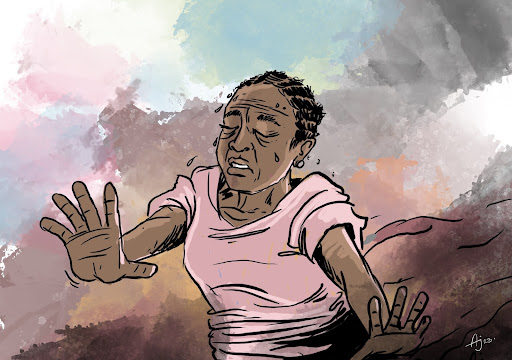The Blind Woman Who Escaped Terrorists In Southern Kaduna
When Ladi Damisa lost her sight years ago, she never expected she would one day be forced to leave her home. She did so fleeing terrorists, running from her house on foot.

Ladi Damisa was alone in her bedroom when suddenly she knew something was wrong. She heard gunshots and people screaming outside.
“So I rushed out of the room. Even though I couldn’t see, I could feel the chaos everywhere.”
There were others running for their lives, so Damisa ran for her life. She knew that if she didn’t run she would die. Only, Ladi Damisa is totally blind. She could not see where she was running.
She ran blindly, until she was brought to a sudden, painful halt.
Personal terror
Long before her village was attacked by gunmen, Ladi Damisa went through her own personal terror. What had started as mere eye pain later led to total blindness.
“After my husband passed away twenty years ago, I worked hard on the farm to feed my six children,” Damisa said. “My first child is in his thirties while the last is in his twenties. But then the eye problem started in 2013 and I couldn’t figure out why it was happening. It started with one eye but eventually spread to the other.”
Ladi, whose village, Dogon Noma, is in Kajuru Local Government Area (LGA) of Kaduna State, northwest Nigeria, visited both hospitals and traditional medicine men in vain. None could figure out why her sight was slowly failing, and all she could do was try to manage the pain until she slowly lost her vision.
Before she was later forced to leave Dogon Noma in 2019, she became dependent on her children and “the generosity of kind neighbours for sustenance.”
Even though Ladi slowly adjusted to a life of blindness, there were still many things she couldn’t do for herself.
Another form of terror
When the terrorists came, on March 11 2019, Ladi knew she had to run, even though she didn’t know which direction she should run towards. With no one at home to guide her, she only hoped that she could somehow make it out alive.
“I ran until I accidentally ran into a big tree, which forced me to fall to the ground and that’s where they found me.”
Ladi could not see her attacker’s face or calculate his next move. He stood over her and spoke harshly in a language she didn’t understand.
“The first blow of the cutlass hit me right in my forehead and the second blow hit me at the nape of my neck.”
In excruciating pain, Ladi passed out right there by the tree. She was later discovered by rescuers who drove her to a hospital in the nearest village.
Evil combination
In July 2020, the presidency of the Federal Republic of Nigeria described the violence in southern Kaduna as an “evil combination of politically-motivated banditry, revenge killings and mutual violence by criminal gangs acting on ethnic and religious grounds.”
According to the data provided by the Council on Foreign Relations, Kaduna State is the second most insecure state in Nigeria after Zamfara State. Reports by Amnesty International show that the violence could be traced back to the 2011 elections during which many people lost their lives and properties.
But for Ladi, the reality of looming terror began in 2018.
Back then stories of numerous attacks in neighbouring villages began to spread and Rohila, her daughter, arranged for her to move to Dogon Noma. Before then, Ladi had lived her entire life in the small settlement of Unguwan Damisa in Kutura, also in Kajuru LGA.
So, Ladi, her son, and other extended family members, including her mother in-law, came to live in Dogon Noma.
Little did they know that their latest abode would have its own share of attacks.
Surviving the hard way
“I was just so happy to learn that none of my children were killed, even though one of my daughters suffered a life threatening injury as a result of the attack,” she told HumAngle.
Her daughter, Rohila, suffered great loss. The attackers cut her arm off and killed three of her children.
Now they live close to each other in Mararaban Kajuru, a bustling part of the local government area.
“My son, Francis, was able to get a house and I currently live there with him and his family,” she said, adding that the family pays rent of N12, 000 annually. “This amount may not seem like much to many but my family still struggles to pay it.”
Things have been tougher for Ladi since her displacement. Her children struggle to get work to do. Even with the occasional farm work, their standard of living has significantly reduced.
“It hurts us that we cannot go back to our home even though we have lands there that can help feed us and take care of our daily needs,” she said.
Support Our Journalism
There are millions of ordinary people affected by conflict in Africa whose stories are missing in the mainstream media. HumAngle is determined to tell those challenging and under-reported stories, hoping that the people impacted by these conflicts will find the safety and security they deserve.
To ensure that we continue to provide public service coverage, we have a small favour to ask you. We want you to be part of our journalistic endeavour by contributing a token to us.
Your donation will further promote a robust, free, and independent media.
Donate HereStay Closer To The Stories That Matter




